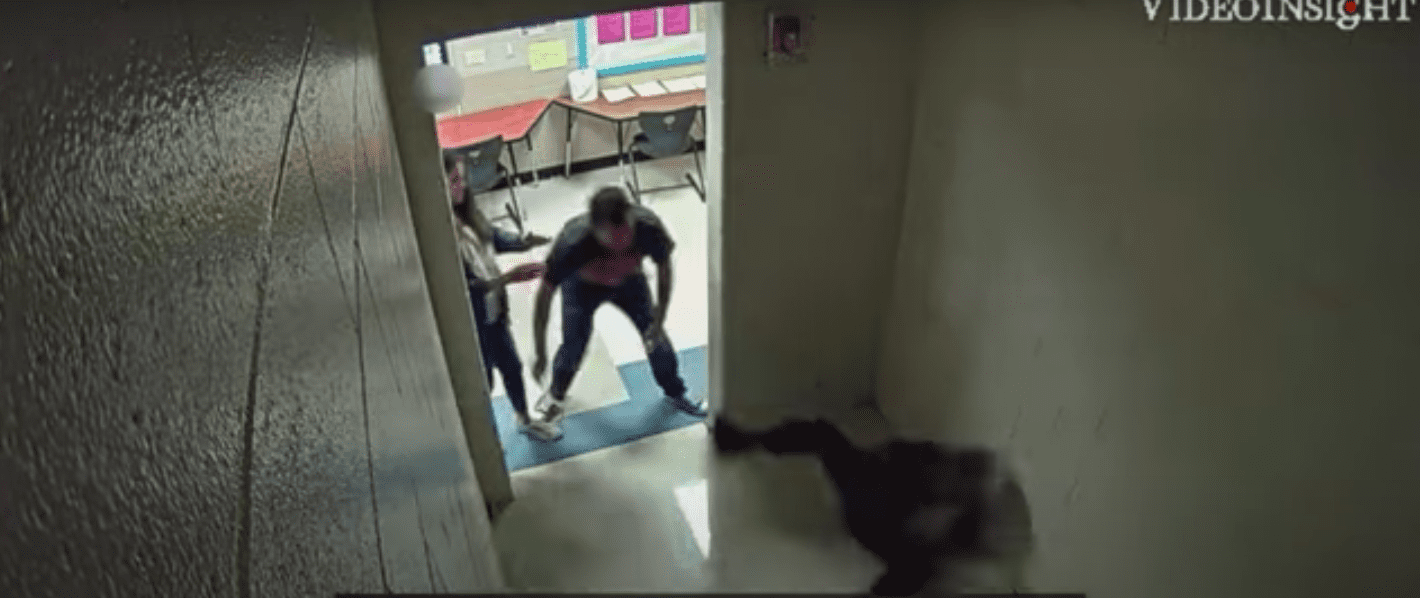Multiple allegations suggest the most vulnerable children in Texas are being abused in government schools.
On September 11, Texas Scorecard launched its four-part investigative series Predators in Government Schools (Parts 1, 2, 3, and 4). That series exposed how Educator Sexual Misconduct had made the state’s government schools a hostile learning environment. It also exposed multiple allegations of government school districts either covering up or ignoring red flags around bad actors targeting students.
There are more dangers. Children and youth are already vulnerable to the predations by adults. However, there is a segment of our population that is particularly vulnerable: those in need of special care.
These dangers were touched on in season six of Texas Scorecard’s serial podcast Exposed.
Warning from the Past
It was 1982, the start of the Reagan Revolution. Many point to this as the beginning of the resurgence of a once declining America.
For students of Eastside High School in Patterson, New Jersey, it was a turning point as well. Their institution of learning had been widely reported to be a “cauldron of violence.”
“Students carried guns and knives, and were routinely shot and stabbed. Drug deals were conducted in hallways. Teachers were threatened in the classrooms. Couples took turns making out in the restrooms, to the point of having sexual intercourse,” wrote Clarence Page of the Chicago Tribune. This was the environment Principal Joe Clark entered. Page recounts that in week one, Clark expelled more than 300 students from the 3,000 member student body. He also brought a tough disciplinary and accountability culture to the school.
His turnaround bore fruit. “Reading and math scores rose. So did the number of Eastside graduates accepted by colleges. So did student morale,” Page wrote. In 1985, it was widely reported that a senior praised Clark’s efforts to the state board of education. “Had it not been for Mr. Clark’s appointment, I would be attending a private school right now,” then Senior Trene Cornish told the board. “I came to Eastside at the same time as Mr. Clark … If you didn’t want to learn, Eastside was not the place for you.”
Clark’s reforms got the attention of President Ronald Reagan, and his Secretary of Education Bill Bennett. His story also inspired the 1989 movie “Lean On Me,” starring Morgan Freeman as Clark.
Clark’s legend lives on even after his death in December 2020. At the start of the next year, the taxpayer-funded NPR interviewed two of his former students, who had married each other.
“When Mr. Clark was there, I felt safe. So I did go to school. I did all that I could. And then when I felt like I was not going to go on the right path, before I could even get off, Mr. Clark put me back on the right track,” Debra McEntyre said. “He definitely showed me, you know, and taught me accountability and responsibility.”
Thomas McEntyre agreed. Clark had kicked him out of the school. “I was doing the wrong things. I was hustling in the streets, the street life that I was accustomed to by the housing development that I came from. And Clark just did not have it,” he said. “In the process of kicking me out, he said, you can always come back to me and talk to me. I’m going to still check on you. And you’re not going to allow the excuses that [are] around you – no dad in the house – you [are] not going to allow that to deter you from your success. You have the ability. You’re gifted. And although at a young age, I was very upset at him for kicking me out, later on I realized that, wow, don’t let these excuses pull you down.”

Principal Joe Clark
Clark left an enduring legacy, that of a warrior determined to restore a dangerous school into a safe institution of learning. After his time at Eastside, in 1989 Clark left a stark warning on education.
“Public education in this country is institutionalized child abuse,” he was widely reported to have said at an event marking an endowment to Pacific Lutheran University. “The education system is rotten to the core … “
His words and warnings were about the poor quality of education at the time. While education standards have continued to crater, Clark has proven prophetic in Texas in a different way.
Round Rock ISD
In the early 1980’s, Eastside High was called a “cauldron of violence.” Fast forward to today, multiple allegations suggest the same could be said for Texas’ government schools where it concerns the most vulnerable among us.
The first school district is one Texas Scorecard has reported on multiple times in the past few years.
“As a parent and as an educator, I feel like I have not been taken seriously at all ever at any point by Round Rock ISD.” Those are the words of Tatiana Alfano, a pre-K teacher. She is also the mother of Quintin, a special needs student who attends the district. Tatiana said he has “a pretty intensive” individualized education plan (IEP), and has had one “pretty much his whole academic life.”
In October 2022, Texas Scorecard reported on how, in April of that year, a surveillance recording showed former vice-principal Jacob Thomas throw Quintin into a brick wall.
Tatiana obtained this recording. She also obtained one taken moments beforehand, which Texas Scorecard reviewed. It shows two teachers trying to prevent Quintin from going to another part of the school. While he tried to evade them, he did not become violent and the recording ends with the teachers successfully gaining control of him.
What led up to this?
According to Tatiana, the school district made it appear as though her son was the problem. “The school had called me and told me that Quintin was being really defiant and very difficult. There had been an altercation, and they had to put [him] in a restraint.” She said they felt he wasn’t safe enough to get on the bus so she had to get him, only to later walk this back.
The district sent Tatiana a report of the incident, which she provided to Texas Scorecard. The report claims that Quintin was “charging at staff,” and “was threatening to hit staff, then spit in staff’s face.” His behavior was categorized as “Imminent Serious Physical Harm to Others.”
Quintin denied everything to his mother, pleading that his hands were in his pockets and the district was lying. “I as a teacher, I still have to err on the side of believing the teachers and following through with discipline at home, as in the classroom,” Tatiana said. Regardless, she decided to conduct her own investigation, and requested recordings of the incident. She said what she saw completely contradicted the stated narrative.
“It took almost two weeks for me to meet via zoom with the Round Rock staff to view the video which I did, and I was shocked.” She said what led up to the two videos above was Quintin refusing to follow a teacher’s instruction to log out of the teacher’s account to do school work. “He wanted to do it on her account instead of logging into his own account. The teacher insisted that he needed to log out of hers and login to his. He’s like, ‘No, it’s really not a big deal,’” Tatiana said. “The teacher got upset and requested that the other two teachers physically remove Quintin from the classroom. Quintin did not want to be removed [from] the classroom, [he] wanted to do the work.” Tatiana said the restraint the teachers used to remove Quintin was “ordinarily” a “CPI compliant restraint where two teachers take a student under each arm and just move him forward.” The recording of the two teachers in the hallway with Quintin show this restraint being used on him again.
CPI is also known as “Non-Violent Crisis Intervention,” which is widely described as methods to “safely restrain students with aggressive behaviors.”
Tatiana told Texas Scorecard that the teachers took Quintin into a “calm down room.” She described it as “a room that is dedicated for children that are having pretty explosive emotions where teachers may feel like they’re going to be aggressive, but it is not legally allowed for people to hold the children in there.” She said such rooms have no doors, are completely empty, with few if any lights in order to not overstimulate. “The rooms are also there for students who willingly need a space that is less stimulating.”

Screenshot of Round Rock ISD recording.
Once in the “calm down” room, Tatiana said that her son “immediately calmed down … They’re not keeping him in that room. There’s still an opening in the doorway.” She said that in the recording she saw, Vice Principal Thomas came in and tagged out the other two teachers.
When Quintin tried to follow the teachers out, Thomas grabbed him by the shirt and threw him back inside, causing him to hit the wall and land on his shoulders and head. Tatiana said this caused Quintin pain and trauma. “He was well within his rights to walk out with those two female teachers,” she explained. “You cannot hold children in the calm down room. Quintin’s Behavior Intervention Plan, it clearly states that when [he] is upset, they are supposed to provide proximity control and move away from him. That’s protocol for dealing with Quintin.”
After restraints are used, Tatiana said “processing” takes place where children have to apologize for what they did wrong. In Quintin’s case, Tatiana was appalled at what she said was her son’s processing. “My son had to apologize to his abuser. The entire time, Jacob Thomas, the vice principal, was gaslighting my son.” Tatiana also said the two other teachers involved lied about the incident as well, pushing the official school district story.
Tatiana said her son and Thomas have had several interactions. “He has told me several times that [Thomas] is quite the hothead.”
The Texas Education Agency investigated the matter. Tatiana provided Texas Scorecard with copies of the agency’s investigative findings (dated March 30, 2023). The document states TEA sustained allegations against Round Rock ISD. “The video shows that the student was subjected to aversive techniques when s/he was thrown into a room by a staff member and when s/he was held on the ground by the two [Local Education Authority] staff members.”
The document points to the Texas Education Code to define “aversive techniques.”
[It] means a technique or intervention that is intended to reduce the likelihood of a behavior reoccurring by intentionally inflicting on a student significant physical or emotional discomfort or pain. The term includes a technique or intervention that . . . employs a device, material, or object that simultaneously immobilizes all four extremities, including any procedure that results in such immobilization known as prone or supine floor restraint.
The TEA also found that the walking restraint used on Quintin in the hallway was “a restraint in that it significantly restricts the free movement of the student’s upper body and in that it significantly restricts the student’s overall free movement (i.e., the student could not move to a location of his/her own choosing on his/her own volition while being transported), and the [district] did not ensure that the restraint was documented and reported as such.” TEA also wrote that “physical force cannot be used to place a student in time-out, which was done in this case.”
TEA handed out a number of corrective measures they expected Round Rock ISD to put in place. These included a review of the district’s policies to determine if they must be altered in order to prevent future “noncompliance” and training of special education and campus administrative staff, including training to document and report restraints, not use aversive techniques on students, and not use physical force to place them in time out.
A TEA document dated April 11, 2023 noted that only one out of five action steps had been completed. The rest were due by May 1, 2023.
Texas Scorecard sent copies of these documents to the TEA and asked them to verify their authenticity. “TEA can confirm the authenticity of the attached documents, and the corrective actions are in progress,” replied Melissa Holmes, TEA’s Media Relations Specialist. “The agency has received two additional complaints related to the district that have been subsequently closed out.” Holmes wrote this on Sept. 14, 2023. The April TEA report said the rest of the measures were due on May 1. Texas Scorecard asked if the district had not completed the itemized actions by the due date, or had additional follow-up corrective measures been assigned. We also asked about the nature of the “two additional complaints” TEA received. No response was received before publication.
Even before this incident, Tatiana said Round Rock ISD did not provide adequate special needs services for her son. She felt she constantly had to “play hardball” to get him the resources and services she felt he needed, that it was too difficult, and she was not taken seriously as a parent and educator by the district.
Originally, after viewing the school district recordings herself, Tatiana had hired an attorney and sought for the district to take corrective measures. Included in this list were requirements for CPI training for school staff, and for a neutral third-party to attend to a child after such restraints are utilized. She said the school district refused to change the processing procedures, but did agree to the retraining. “I don’t have any evidence that they did the retraining, but they said they did.”
As previously reported, Tatiana also hit a brick wall in trying to get the school district to take accountability in this matter, even to the point of members of the school board trying to stop her from speaking. After she shared online the recording of her son being thrown into the brick wall, Tatiana said Superintendent Dr. Hafedh Azaiez offered her $10,000 to take it down.
She refused.
Tatiana said Thomas was never fired for his actions. Instead, he was allowed to resign. “He’s still fully credentialed; he can be teaching in any classroom anywhere.”
Ashley Ruiz, Community Relations Coordinator for Round Rock ISD, gave the following statement to Texas Scorecard. “Mr. Thomas is no longer employed with Round Rock ISD. He resigned in June 2023. The incident you reference was handled in accordance with district policy, local guidelines and state law, including notification to relevant agencies.”
This is a recent event. However, there is another allegation, against a district north of Round Rock, that government school officials’ actions resulted in a special needs student being raped.
Dallas ISD
Texans expect Government schools will be a safe learning environment for students, and that the most vulnerable among us will recieve an extra measure of care.
A lawsuit filed in November 2015 suggests the exact opposite is taking place in Dallas ISD. Attorneys Lori Browne and Hal Watson of the Dallas-area represented a victim and her mother who sued the district. Both were previously interviewed by Texas Scorecard about the difficulty of victims and their families to hold government schools accountable for Educator Sexual Misconduct.
The filed complaint centered around “T.W.,” who at 14 years old attended Justin F. Kimball High School. She’s described as “a minor child with severe disabilities that qualify her as ‘special needs.’” Specifically, she has “Cerebral Palsy and Static Encephalopathy.” The complaint said “T.W.” was “repeatedly sexually assaulted and raped” at Kimball “during school hours.” While she was 14 years old at the time, “she mentally and cognitively functioned at the level of a” nine-year-old. It is also noted that school records reported she “has insufficient mobility skills for safe travel on regular school bus” when the sexual assaults occurred.
In an interview with Texas Scorecard, Dr. Charol Shakeshaft, a specialist in the study of Educator Sexual Misconduct, stated students with disabilities, or those learning English as a second language, are more vulnerable and less able to advocate for themselves. She also noted that boundaries tend to be treated differently for special needs students, putting them more at risk. Shakeshaft said “we do find a larger representation of abuse students among students with special needs” and those for whom English isn’t their first language.
The alleged assaulter was a 20-year-old special needs student also attending the school at the time, referred in the complaint only as “V.A.” In the fall of 2013, both “V.A.” and “T.W.” attended the same class at Kimball.
The complaint said “V.A.” had told another student he wanted to “hump” “T.W.” When “V.A.” “touched her multiple times,” “T.W.” told her case manager that “that she had told V.A. to stop touching her but that he would not stop.” He repeatedly tried to bring her into their classroom’s bathroom. “T.W.” reported this on December 3, 2013 to her case manager, who “immediately” informed Principal Jones and Vice Principal Waters. A meeting was held that same day, and another on December 5, this one involving the students, their parents, Waters, and Jones.
How did government school officials respond, according to the complaint? “Kimball’s administrators relocated V.A.’s seat within Ms. Jones’ FLS classroom. School administrators moved V.A.’s seat to the very rear of the classroom behind a half-wall, directly in front of the restroom,” an amended complaint stated. “T.W.’s” mother “was not informed by the school.” What’s more, “all students in the classroom were required to use” this bathroom.
The amended complaint said that “T.W. repeatedly asked Ms. Jones [her classroom teacher] if she could use another restroom … but her requests were always denied.” The complaint said Ms. Jones pointed to “school rules.”
The complaint said this dangerous situation exploded in the last week of January 2014. “V.A. ‘violently raped’ T.W. Ms. Jones, the usual teacher, was not in the classroom at that time. The school’s two teacher policy was not being followed, as there was only one teacher was in the classroom,” the complaint stated. “T.W. told her mother, who called school administration, who called CPS and the police. District promised to investigate but shared nothing with the parents.” The pseudonym “Jane Doe” is used to identify “T.W.’s” mother.

Dallas ISD
The amended complaint raised even more questions about the school.
“Jane Doe and her husband asked the administrators and teachers that day, why with so few students in the class why T.W. and her assailant V.A. were not missed from the classroom during the rape and why no one had checked on them and determined that they were ‘both’ in the restroom.”
The amended complaint included a shocking allegation of a school employee’s reaction to the rape. “Ms. Camacho, one of the aides present in T.W.’s classroom when the rape occurred, pulled T.W. aside multiple times when T.W. was at school after her outcry and tried to convince T.W. that the rape ‘never happened’ and T.W. ‘made it all up.’”
While “T.W.’s” mother reported the rape to Child Protective Services, that investigation itself took a shocking turn. “Over the next couple of weeks Kimball school personnel, as well as officials from Texas Department of Family and Protective Services (CPS), extensively questioned T.W. at school about the rape by V.A. without her parents’ permission or knowledge,” the amended complaint states.
Texas Scorecard has published multiple investigative reports regarding the corrupt Texas Department of Family and Protective Services. From their attack on the family unit to their deep state rebellion against public servants, to losing minors in their care to sex slavery, multiple red flags strongly indicate that the state agency is in dire need of state lawmakers to force it into compliance.
The amended complaint raised more flags about the investigation. “Principal Jones and Vice Principal Waters told Jane Doe and her husband that day that they would be investigating the rape and assured them of T.W.’s safety, but Jane Doe was never given any information regarding whether they had in fact conducted any such investigation and if so, what the outcome of the investigation had been.”
The original complaint said there were more red flags surrounding “V.A.” Early in the Fall 2023 semester, another female student “reported being touched sexually inappropriately” by “V.A.” The girl in question, identified with the pseudonym “M.E.,” wasn’t an English speaker at the time, but was “fluent in Spanish.” “After M.E.’s report of V.A.’s sexual assault she was placed in a separate classroom from V.A.; V.A. was still however permitted to remain in class with T.W.,” the complaint read.
School officials ignoring red flags was a common theme examined in Texas Scorecard’s investigative series Predators in Government Schools. The amended complaint alleges school officials did this too:
“After M.E.’s report of V.A.’s sexual assaults on her to Vice Principal Waters through Ms. Gilbert and Ms. Gray, she was placed in a separate classroom from V.A. Despite the fact that T.W. had reported to her teacher Ms. Jones that V. A. had touched her in a sexually inappropriate manner on several occasions, T.W. was still required to be in the same classroom as V. A.”
Allegedly, the school’s bad actions didn’t end there. The amended complaint said that despite what “T.W.’s” parent had been told earlier by the school, she discovered that “V.A. had not been suspended or expelled.” The school also hasn’t taken any other action to prevent “further contact with T.W.” Starting on March 6, 2014, “T.W.’s” mom kept her from school out of fear for her safety. She also repeatedly contacted Dallas ISD administration, asking that “T.W.” be transferred to a different school. “Jane” got no response. Instead, she was notified “that she was being charged with the crime of truancy.”
Meanwhile, the amended complaint shared how “T.W.” was dealing with the fallout from the rape, noting that school records documented her academic struggles. Also, a forensic psychologist hired by the plaintiffs would testify “that T.W. has sustained lifelong psychological damages from V.A. sexually assaulting and raping her for which she will need extensive lifelong therapy. In addition to physical pain, suffering and bodily injury, T.W. has suffered from emotional harm and mental anguish continue to suffer from same in the future …”
On October 25, 2019, the U.S. Fifth Circuit Court of Appeals reversed a District Court decision to dismiss this case, and remanded it back to them. The case was settled.
Texas Scorecard interviewed “Jane Doe” and “T.W.’s” attorneys: Lori Browne and Hal Watson. They said because of the stipulations in the settlement agreement, there was little they could discuss. Browne did reply to our question regarding what about this case stood out to him. “The main part was obviously the egregiousness of the conduct on the part of the administration, in terms of the information that they had available to them about what was likely to happen to this plaintiff, and then not really actually taking any positive action to prevent it,” he said. “That’s what we see in a lot of our cases where the administration basically just kind of sits on it, and doesn’t do anything positive about it.”
Dallas ISD Board President Justin Henry did not respond to Texas Scorecard’s request for comment on this case.
The Vulnerable
In September, Texas Scorecard launched its investigative series Predators in Government Schools. This series examined how Educator Sexual Misconduct (ESM) has turned the state’s government schools into hostile learning environments for students. It also examined the difficulty for victims and their families to hold these schools accountable.
“Special education students or other vulnerable students are often targets of sexual predators,” wrote Dr. Shakeshaft in her 2004 paper on this topic. She further expounded on the problem in an interview with Texas Scorecard. She believes educator sexual misconduct is more common among special needs students.
Debra Liva, a special education advocate for roughly 30 years, agrees. “I think [this kind of abuse] happens more often than than we know. Unfortunately we are working with students with disabilities and some of them nonverbal,” she told Texas Scorecard. She discussed one of her very first cases involving a wheelchair bound client who was allegedly sexually abused. The school’s Admission, Review, and Dismissal (ARD) paperwork required for two people to help him go to the bathroom. Debra said that didn’t happen. “They sent one person in there, and that one person was sexually harassing or asking for sexual favors. That aide spent 10 years in prison. He confessed.”
Why is it, whether it’s school officials not using proper procedures with special needs students, or failing to protect them from abusers, Texas government schools are not taking care to protect the most vulnerable among us?
Source Documents
For this article, Texas Scorecard reviewed a court case filing, where the victim used the pseudonym of “T.W.” and the Plaintiff used the name “Jane Doe.”
Jane Doe, Individually, and as Next Friend of Minor T.W. v. Dallas Independent School District (Original Complaint Filed November 25, 2015; Amended Complaint Filed February 18, 2016; Opinion by the U.S. Fifth Circut Court of Appeals Filed October 25, 2019).
This publication also reviewed records obtained from Tatiana Alfano, a Round Rock ISD parent. Texas Scorecard has redacted personal identification information from these records.
A “Written Summary of Restraint Use” from Round Rock ISD regarding the incident that occurred on April 29, 2022.
“Notice of Findings” from the Texas Education Agency’s investigation (Dated March 30, 2023).
“Notice and Receipt of Special Education Corrective Action” from the Texas Education Agency (Dated April 11, 2023).
We also reviewed:
Educator Sexual Misconduct: A Synthesis of Existing Literature, by Dr. Charol Shakeshaft (2004).
This article contains highlights from these documents. Citizens wishing to conduct a deep dive should click the links above.
In part two of this series, Texas Scorecard will continue examining schools failing special needs students.
No ads. No paywalls. No government grants. No corporate masters.
Just real news for real Texans.
Support Texas Scorecard to keep it that way!





